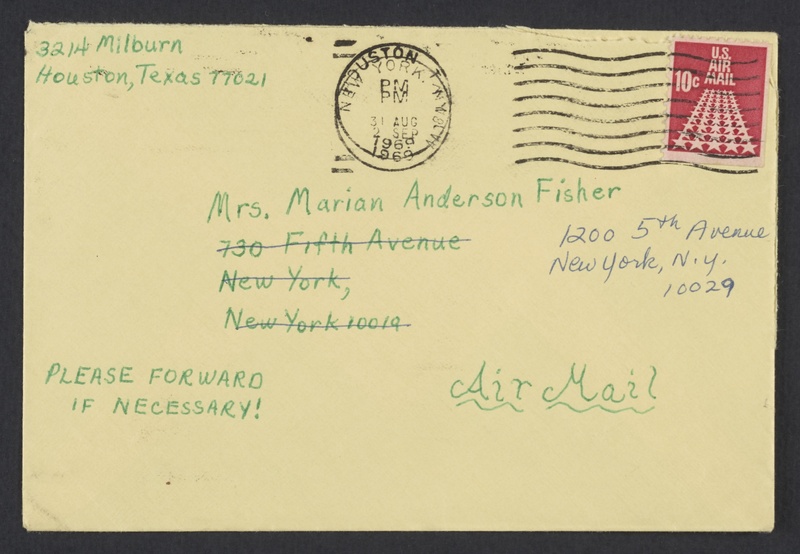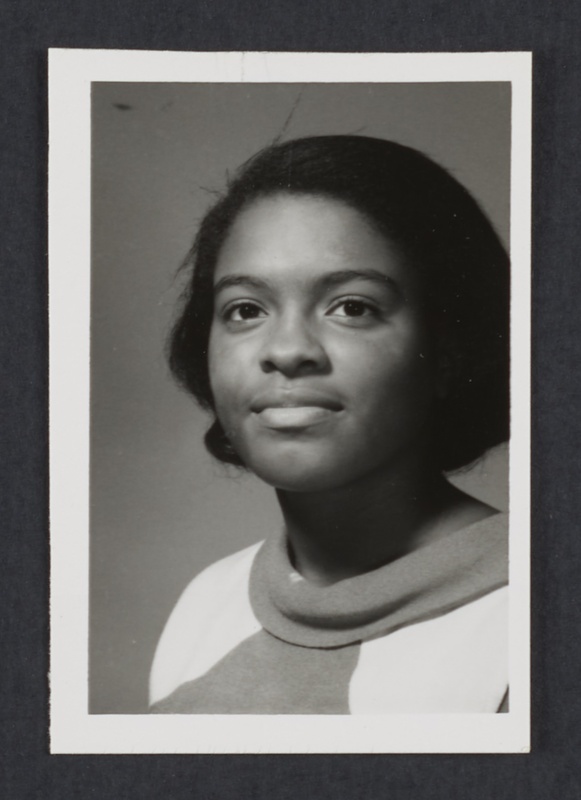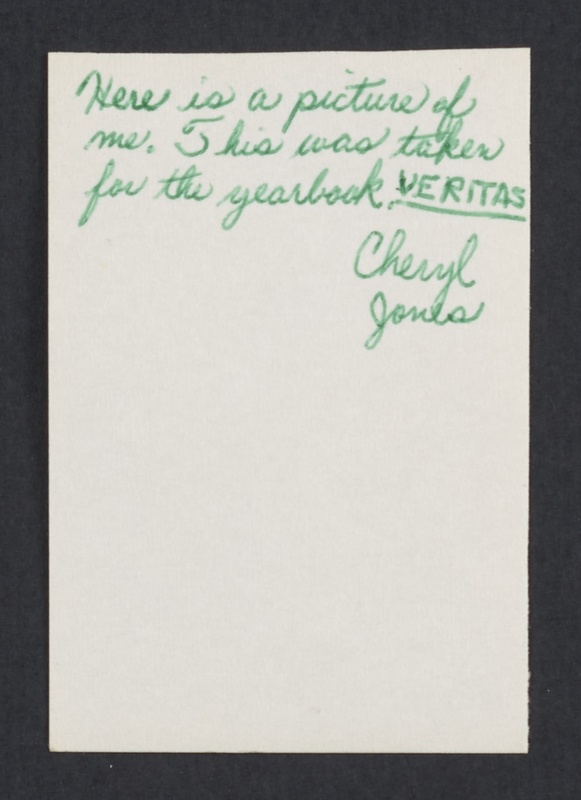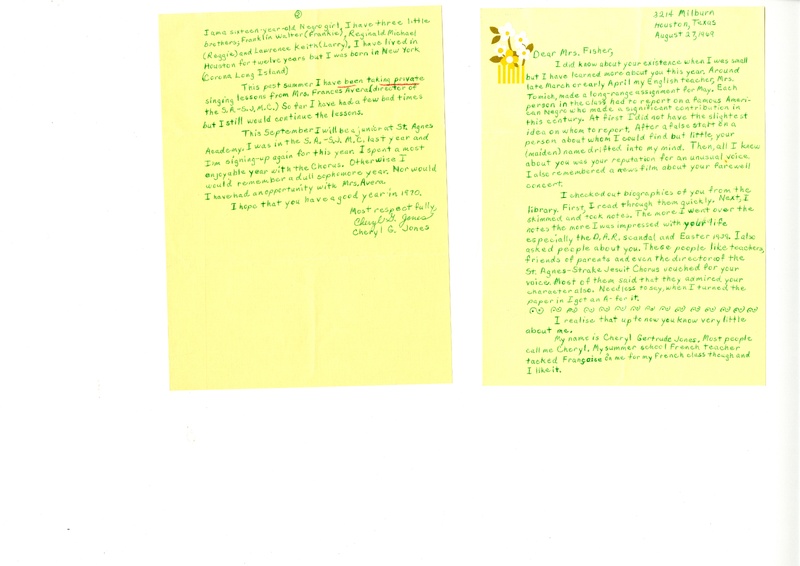-
Title
-
Letter, Cheryl G. Jones to Miss Anderson, August 27, 1969
-
Description
-
An envelope, two-page letter, and signed photograph mailed by high school student and aspiring singer Cheryl G. Jones to globally renowned contralto Marian Anderson Fisher (1897-1993). The letter is among many letters from aspiring singers and musicians included in the Marian Anderson Papers. Anderson's life was an inspiration to them and to countless others in the United States and abroad (Kruesi 1998).
-
In the letter, Jones talks of her process and success of writing a report on Anderson for a school assignment. Jones also shares biographical information about herself. The photograph is an image of Jones taken for her high school yearbook, which she inscribed and signed on the back. The envelope features two postmark dates, a lined through address to which Jones originally mailed the letter and a new address to which the mail was forwarded.
Marian Anderson was born to Anna Delilah Rucker Anderson and John Berkeley Anderson in South Philadelphia, Pennsylvania on February 27, 1897. She was the first of three girls all of whom sang. Anderson performed a repertoire that included over 200 songs of many genres including traditional Black spirituals, folk music, and “arias in German, Italian, English, French, Spanish, Portuguese, Swedish, Finnish, and other languages” (Kruesi 1998). She performed in the United States, South America, Europe, and Asia. Her career spanned from the 1920s through the 1970s–although she formally retired in 1965 (Kruesi 1998). Anderson’s achievements were numerous and iconic. In 1936, she became the first African American invited to perform at the White House (American Experience and PBS 2017). In 1955, she was the first African American woman to be invited to sing at the Metropolitan Opera in New York (American Experience and PBS 2017; Brown-Cáceres 2013). At one point, she was the third highest concert box office draw in the United States (American Experience and PBS 2017). In 1963, she was awarded the Presidential Medal of Freedom by President Lyndon B. Johnson, the Congressional Gold Medal in 1977 during the Carter administration, and bestowed with the Kennedy Center Honors in 1978 (National Archives 2024).
Despite her artistry, popularity, and global impact, the United States subjected Marian Anderson to racial prejudice like all African Americans of her time. Cheryl Jones’ letter mentions the Daughters of the American Revolution (DAR) Constitution Hall incident, which is arguably the most famous of these racist affronts. In 1939, Anderson’s manager tried to secure her performance at Constitution Hall. However, DAR denied her the opportunity because she was Black. In response, Marian Anderson performed a free, open air, integrated, Easter Sunday concert on the steps of the Lincoln Memorial in Washington, DC on April 9, 1939. An estimated 75,000 people attended (Marian Anderson 1939).
Anderson married Orpheus “King” Fisher on July 24, 1943. Between tours, together they lived on their farm near Danbury, Connecticut until his death in 1986. Anderson continued to live on her farm well into her nineties. She spent the last seven years of her life in Portland, Oregon with her nephew, conductor James DePriest, and his wife Ginette (Penn Libraries, n.d.).
She died of congestive heart failure on April 8, 1993.
More information is available in the annotation of the image.
-
Rights
-
Copyright restrictions may exist. For most library holdings, the Trustees of the University of Pennsylvania do not hold copyright. It is the responsibility of the requester to seek permission from the holder of the copyright to reproduce material from the Kislak Center for Special Collections, Rare Books and Manuscripts.
-
Date
-
1969-08-27
-
Format
-
Text
-
Language
-
eng
-
Spatial Coverage
-
Houston, Texas
-
Contributor
-
University of Pennsylvania: Kislak Center for Special Collections, Rare Books and Manuscripts
-
Identifier
-
Ms. Coll. 200 Box 124
-
transcription
-
3214 Milburn
Houston, Texas
August 27, 1969
Dear Mrs. Fisher,
I did know about your existence when I was small but I have learned more about you this year. Around late March or early April my English teacher, Mrs. Tomich, made a long-range assignment for May. Each person in the class had to report on a famous Ameri-can Negro who made a significant contribution in this century. At first I did not have the slightest idea on whom to report. After a false start on a person about whom I could find but little, your (maiden) name drifted into my mind. Then, all I knew about you was your reputation for an unusual voice. I also remembered a news film about your farewell concert.
I checked out biographies of you from the library. First, I read through them quickly. Next, I skimmed and took notes. The more I went over the notes the more I was impressed with your life especially the D.A.R. scandal and Easter 1939. I also asked people about you. These people like teachers, friends of parents and even the director of the St. Agnes-Strake Jesuit Chorus vouched for your voice. Most of them said that they admired your character also. Needless to say, when I turned the paper in I got an A- for it.
I realise that up to now you know very little about me.
My name is Cheryl Gertrude Jones. Most people call me Cheryl. My summer school French teacher tacked Françoise on me for my French class though and I like it.
2
I am a sixteen-year-old Negro girl. I have three little brothers; Franklin Walter (Frankie), Reginald Michael (Reggie) and Lawrence Keith (Larry). I have lived in Houston for twelve years but I was born in New York (Corona Long Island)
This past summer I have been (underlined) taking private (underlined) singing lessons from Mrs. Frances Avera (director of the S.A.-S.J.M.C.) So far I have had a few bad times but I still would continue the lessons.
This September I will be a junior at St. Agnes Academy. I was in the S.A.-S.J.M.C. last year and I’m signing-up again for this year. I spent a most enjoyable year with the Chorus. Otherwise I would remember a dull sophomore year. Nor would I have had an opportunity with Mrs. Avera.
I hope that you have a good year in 1970.
Most respectfully,
Cheryl G. Jones (in cursive)
Cheryl G. Jones (in block script)
-
Subject
-
African American women singers
-
Anderson, Marian, 1897-1993
-
Correspondence
-
High school students
-
Letters
-
Youth, Black








